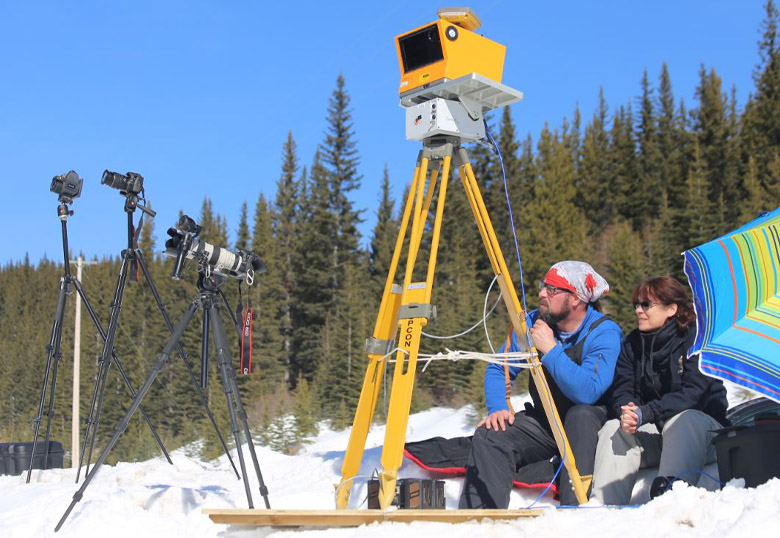Geomatics-related fields of study are taking another significant step forward at the University of Lethbridge thanks to major support from TECTERRA and the opening of i4Geo, the Institute for Geospatial Inquiry, Instruction and Innovation.
“This is something we’ve been working towards for some time and to see it come together is exciting and a real positive push for geospatial study,” says Dr. Chris Hopkinson, Professor in the Department of Geography & Environment, The Board of Governors Research Chair in Remote Sensing and Director of i4Geo. “There is so much opportunity in geographical information science, geospatial positioning and imaging technologies, sensor networks, big data analytics, artificial intelligence and 3D digital twins. Bringing these fields of study together under the i4Geo umbrella, encompassing research, training, networking, business innovation and community outreach will further establish ULethbridge as leaders in geospatial technology and its applications.”

Geomatics is a branch of science that deals with the collection, analysis and interpretation of data relating to the Earth’s surface. ULethbridge students are the biggest winners with the introduction of i4Geo.
“The University’s geography department has provided me with many opportunities to work with emerging technologies, such as airborne and drone lidar, as well as do fieldwork across western Canada, learning the most current GIS and geospatial analysis techniques for both my undergraduate and graduate work,” says Emily Jones, a PhD student member of the i4Geo newly formed executive committee. “The TECTERRA-funded i4Geo institute will help continue these opportunities for myself and other students; opportunities to get hands-on research experience and networking opportunities that have real-life applications.”
The emergence of i4Geo is in large part thanks to TECTERRA’s continued support of geomatics-related study and innovation. Since 2009, TECTERRA has supported the advancement of the geospatial sector in Alberta through funding programs targeted at commercializing technology, and more recently has focused its efforts on academia to foster the next generation of geospatial experts and entrepreneurs.
“We understand that staying ahead of the curve requires constant adaptation and innovation and we are particularly excited about i4GEO’s commitment to developing unique academic programs. As the Institute continues to grow and evolve, we look forward to seeing the impact that its students, faculty and partners will have on the world,” says Monty Carter, Managing Chair at TECTERRA.

In 2023, TECTERRA invested $5.2 million in a Legacy Program for Alberta-based universities, out of which $1.3 million was directed to ULethbridge to fund various undergraduate and graduate awards for students engaged in geomatics-related fields, as well as further growth opportunities — i4Geo being one. The University of Lethbridge Board of Governors also matched a portion of those funds as part of its commitment to student scholarships and bursaries.
“Our group of centres and institutes, now totalling 18, serve as exemplars of the incredible breadth of research taking place on campus,” says Dr. Dena McMartin, vice-president (research). “These centres push boundaries, spur innovation and provide opportunity for undergraduate, graduate and postdoctoral students to thrive in a rich multidisciplinary atmosphere that seeks answers to many of our most pressing societal issues. Adding i4Geo to this group further enhances the University’s standing as a leader in this field of study.”
What excites Hopkinson about i4Geo is its broad, multidisciplinary nature. The institute offers undergraduate and graduate degree programs in geography, remote sensing, environmental science, agricultural studies, geographical information science and computer science. There is also a major push to foster entrepreneurship, innovation, business incubation and community outreach.
“As a community of nationally leading geospatial academics and researchers, our faculty and students have so much to offer society beyond the day-to-day activities of degree-focused teaching and grant-funded research projects,” he says. “At its core, i4Geo’s goal is to provide a range of unique and complimentary pathways for community engagement and skills/knowledge dissemination, so that we can more effectively and collectively tackle a wide range of environmental challenges and nurture new opportunities.”
To that end, the institute debuted the first of its three-part series of workshops today — Using R for Geospatial Analysis: Part I. The three-hour workshops are intended for senior undergraduate and graduate students, while also offering individual modules via Continuing Education to members of the public in a blended learning environment.
“These workshops will allow us to support internal degree-level training needs, public education and outreach, as well as provide graduate students and postdoctoral fellows an excellent opportunity to share what they have learned and reinforce their own teaching portfolio in an area of their strength,” adds Hopkinson.
Finishing PhD student, Linda Flade, is hosting the first workshop and says they are designed to grow knowledge of geospatial work internally and externally.
“Through the opportunity afforded by i4Geo to embed my course on using R for geospatial analysis within this innovative series of workshops, I can share the knowledge gained during my PhD program with ULethbridge students and the public in a blended learning framework,” she says. “This will expand knowledge transfer from ULethbridge to the community and will further strengthen my teaching skills and experience.”
